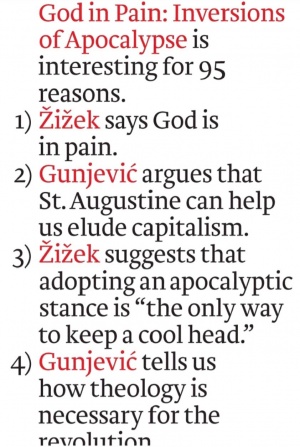Difference between revisions of "God in Pain"
TheoryLeaks (talk | contribs) (Tag: Visual edit) |
(The LinkTitles extension automatically added links to existing pages (https://github.com/bovender/LinkTitles).) |
||
| Line 2: | Line 2: | ||
=====Book Description===== | =====Book Description===== | ||
| − | A brilliant dissection and reconstruction of the three major faith-based systems of belief in the world today, from one of the world’s most articulate intellectuals, Slavoj Žižek, in conversation with Croatian philosopher Boris Gunjević. In six chapters that describe Christianity, Islam, and Judaism in fresh ways using the tools of Hegelian and Lacanian analysis, God in Pain: Inversions of Apocalypse shows how each faith understands humanity and divinity—and how the differences between the faiths may be far stranger than they may at first seem. | + | A brilliant dissection and reconstruction of the [[three]] major [[faith]]-based systems of [[belief]] in the [[world]] today, from one of the world’s most articulate intellectuals, [[Slavoj Žižek]], in conversation with Croatian [[philosopher]] Boris Gunjević. In six chapters that describe [[Christianity]], [[Islam]], and [[Judaism]] in fresh ways using the tools of [[Hegelian]] and [[Lacanian]] [[analysis]], God in [[Pain]]: Inversions of Apocalypse shows how each faith understands humanity and divinity—and how the differences between the faiths may be far stranger than they may at first seem. |
Latest revision as of 08:42, 24 May 2019
Book Description
A brilliant dissection and reconstruction of the three major faith-based systems of belief in the world today, from one of the world’s most articulate intellectuals, Slavoj Žižek, in conversation with Croatian philosopher Boris Gunjević. In six chapters that describe Christianity, Islam, and Judaism in fresh ways using the tools of Hegelian and Lacanian analysis, God in Pain: Inversions of Apocalypse shows how each faith understands humanity and divinity—and how the differences between the faiths may be far stranger than they may at first seem.
